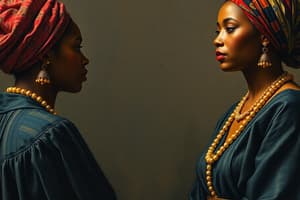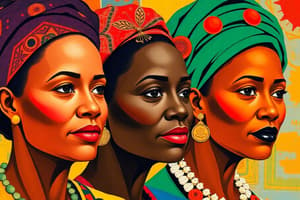Podcast
Questions and Answers
What did the character determined should make her a lady?
What did the character determined should make her a lady?
- Her beauty (correct)
- Her education
- Her family name
- Her wealth
What did Esther want to save her daughter from becoming?
What did Esther want to save her daughter from becoming?
A wretched, loathsome creature
Esther believed that promises of marriage were often genuine.
Esther believed that promises of marriage were often genuine.
False (B)
What was Mary Barton’s desire regarding social status?
What was Mary Barton’s desire regarding social status?
I even offer you marriage, to satisfy your little ______ heart.
I even offer you marriage, to satisfy your little ______ heart.
What was the downside of factory work mentioned by John Barton?
What was the downside of factory work mentioned by John Barton?
What did Esther spend her money on?
What did Esther spend her money on?
How did Esther feel about her past spending habits?
How did Esther feel about her past spending habits?
Mary enjoyed the idea of becoming a lady and doing elegant activities.
Mary enjoyed the idea of becoming a lady and doing elegant activities.
What warning did Jem Wilson give regarding his intentions toward a woman?
What warning did Jem Wilson give regarding his intentions toward a woman?
What issue did Jane Wilson highlight regarding men driven to the public-house?
What issue did Jane Wilson highlight regarding men driven to the public-house?
John Barton warned Esther that if she kept doing what she was doing, she'd end up a ______.
John Barton warned Esther that if she kept doing what she was doing, she'd end up a ______.
What was Harry Carson's view on marrying a lady?
What was Harry Carson's view on marrying a lady?
Flashcards are hidden until you start studying
Study Notes
Gender Themes in Mary Barton
- The desire for elevate social status and beauty drives characters like the narrator and Mary Barton, indicating societal pressures related to femininity.
- Esther's struggle with her self-worth reflects the internal conflict of women seeking escape from poverty through marriage and wealth, emphasizing the burden of gender roles.
Marriage and Expectations
- The notion that marriage is an empty promise is articulated by Esther, showcasing women's vulnerability within the promises made by men.
- Harry Carson's proposition to marry Esther reveals the transactionality of love, where ambitions and social climbing overshadow genuine connections.
Economic Independence
- John Barton highlights the harsh realities of factory work for women, suggesting a fleeting sense of financial independence that ultimately could lead to further dependency.
- The willingness of women like Esther to spend their earnings on superficial pursuits illustrates the lack of awareness regarding financial stability and empowerment.
Identity and Ambition
- The aspiration to rise in social class is a recurrent theme, as seen through Mary's dreams of becoming a lady and enjoying the associated privileges.
- Characters like Jem Wilson advocate for integrity and respect, contrasting sharply with societal views that objectify women.
Social Critique
- Observations of families impacted by women's factory work reveal societal neglect and the moral implications entwined with economic hardship.
- John Barton's warning to Esther about her lifestyle choices serves as a critique of the societal tendency to stigmatize women who seek independence outside traditional norms.
Relationship Dynamics
- Harry Carson's implications of marrying a poor dressmaker reflect societal norms that allow men to choose partners based on social construct rather than love or compatibility.
- The interplay of ambition and moral character is central to the decisions the characters face, raising questions about personal agency and societal expectations.
Studying That Suits You
Use AI to generate personalized quizzes and flashcards to suit your learning preferences.



